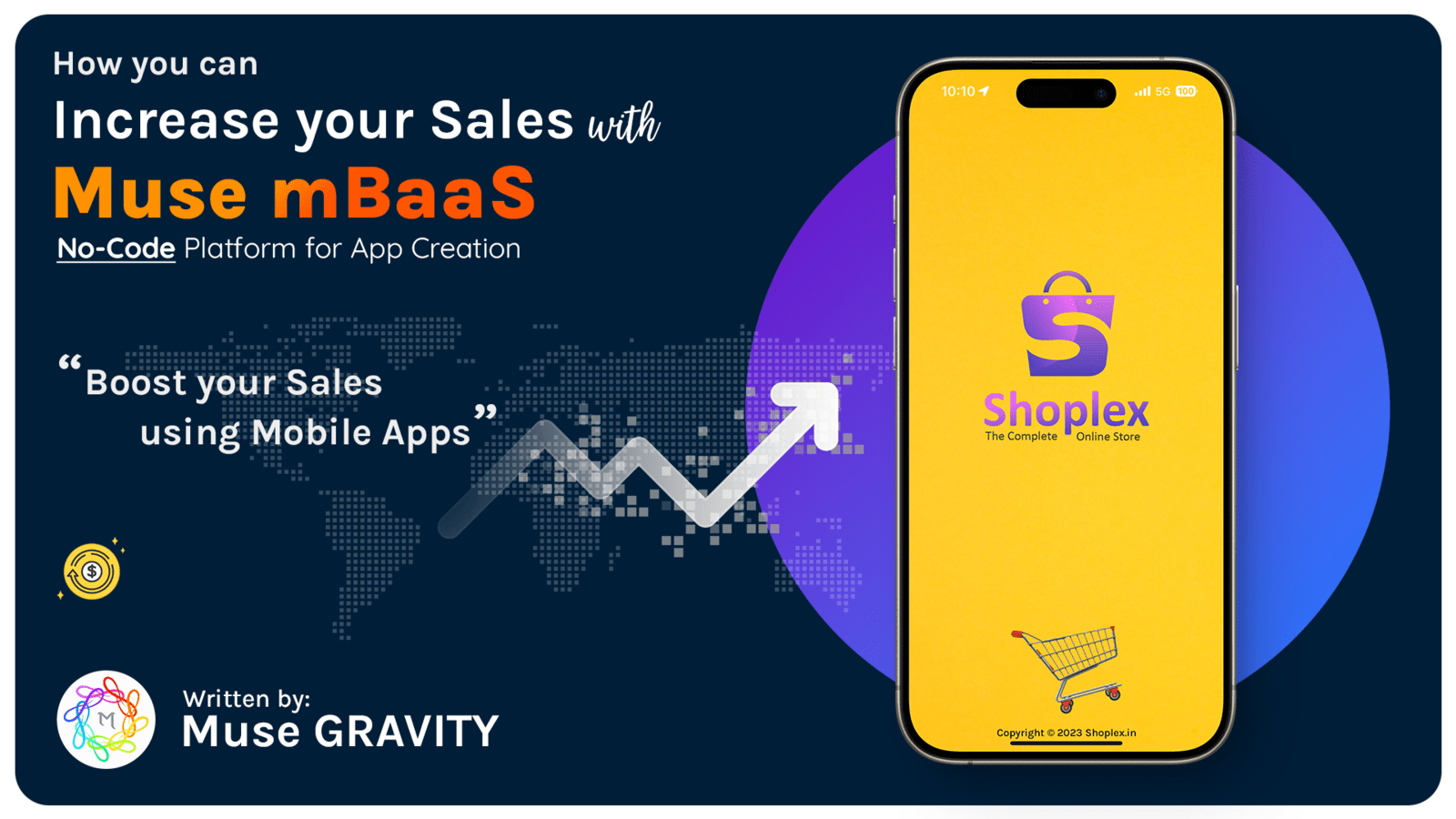
In an era where digital presence is paramount, mobile apps have become vital tools for businesses seeking to enhance their market presence, improve customer engagement, and drive growth. The ubiquity of smartphones has opened up new avenues for firms to connect with customers, offering unique opportunities for personalized interaction and brand building.
This blog explores the multifaceted role of mobile apps in business, examining their benefits, successful case studies, key features, monetization strategies, and the challenges faced during development. We also delve into the importance of user feedback and the current surge in the mobile app market, including how platforms like Muse mBaaS are revolutionizing how businesses approach mobile app development.
Surge in the Mobile App Market:
The mobile app market is experiencing a significant surge. With the average smartphone user engaging with numerous apps daily, the demand for mobile apps is higher than ever. According to a research, the average smartphone user engages with 9–10 apps daily and 30 monthly. Statista.com projects that by 2026, there will be 143 billion mobile app downloads from the Google Play Store alone, a significant increase from 111 billion in 2021. This surge underscores the importance of a mobile presence for businesses. In 2021, over 435,000 apps were downloaded per minute, highlighting mobile apps' immense potential and reach.
The sheer volume of app downloads per minute underscores the vast potential of the mobile app market. As traditional marketing methods become less effective, developing a mobile application becomes crucial for businesses to stay relevant and tap into this growing market.
Benefits of Mobile Apps for Businesses:
- Direct Communication and Enhanced Engagement: Mobile apps create a direct communication channel with customers, allowing businesses to send personalized notifications and updates. This constant engagement helps build a strong customer relationship, increasing loyalty and retention.
- Increased Accessibility and Convenience: Mobile apps allow customers to access services and products anytime and anywhere. This round-the-clock accessibility can significantly enhance the customer experience, leading to higher satisfaction and repeat business.
- Valuable Insights through Data Collection: Mobile apps enable businesses to collect and analyze user data. This data provides insights into consumer behavior, preferences, and buying patterns, helping companies to tailor their offerings and marketing strategies effectively.
- Brand Recognition and Marketing Tool: A mobile app is a direct marketing channel for businesses, enhancing brand visibility. Well-designed UI and UX can also improve brand recognition and serve as a platform for promotional activities and customer engagement.
Case Studies of Successful Business Apps:
- Starbucks: The Starbucks mobile app is a prime example of how a business can integrate payment systems and loyalty programs to enhance customer convenience and loyalty. The app offers customized mobile ordering and payment systems that significantly increase sales and store customer throughput.
- Uber: Uber's app has revolutionized urban transportation. Its success lies in its simple, user-friendly interface that allows users to book rides with just a few taps. The app's real-time tracking of rides, transparent pricing model, and driver rating system have set high standards for app-based services. Uber's ability to adapt to different markets and offer various transportation options has helped it expand globally, making it a benchmark in the ride-sharing industry.
- Amazon: Amazon's mobile app is a prime example of eCommerce success and innovation. The app has significantly contributed to Amazon's dominance in the online retail space. Its user-friendly interface allows customers to browse, search, and purchase various products. Features like 1-Click ordering, personalized recommendations, and real-time order tracking enhance user convenience and satisfaction. The app also integrates with Amazon's Prime membership, offering users exclusive benefits like free shipping and access to streaming services. Amazon's mobile app extends its marketplace reach, making shopping accessible and convenient for users worldwide. The app's success is rooted in its ability to provide a seamless, integrated shopping experience and the company's robust logistics and customer service. It has not only solidified Amazon's position as a leader in eCommerce but also set a high standard for mobile shopping experiences.
Key Features of a Successful Business App
- Intuitive User Interface: The app should have a simple, intuitive interface, making it easy for users of all ages and tech-savviness to navigate and use without frustration.
- High Performance and Reliability: The app must perform well under various conditions, loading quickly and operating smoothly, as performance issues can lead to negative user experiences and app abandonment.
- Personalization Options: Personalizing content and features based on user preferences and behavior can significantly enhance the user experience, making the app more engaging and useful to the individual user.
- Robust Security Measures: Ensuring the security of user data and transactions is critical. A secure app builds trust and credibility among users, which is essential for long-term success.
Monetization Strategies for Business Apps
- In-App Purchases: This strategy involves offering additional features, services, or content for purchase within the app. It's a direct way to generate revenue from users looking for enhanced functionality.
- Subscription Models: Subscriptions provide a steady revenue stream by charging users a recurring fee for access to premium features or content. This model can build a loyal user base that generates consistent income.
- Advertisements: Incorporating ads into the app can be a lucrative revenue source. However, balancing ad placement with user experience is crucial to avoid intrusiveness.
- Freemium Model: Offering a free version of the app with basic features alongside a paid version with additional premium features can attract a broad user base and encourage upgrades.
Challenges in Mobile App Development and Solutions
- Budget Constraints: Developing a high-quality app can be costly. Prioritizing essential features, planning the development phases carefully, and considering cost-effective development methods can help manage the budget.
- Technological Evolution: The fast-paced evolution of technology can make an app obsolete quickly. Regular updates, adopting new technologies, and staying informed about industry trends are essential for keeping the app relevant.
- User Engagement: Keeping users engaged over time is challenging. Regular updates, adding new features, and optimizing the app based on user feedback are crucial strategies for maintaining user interest.
User Feedback and Continuous Improvement
- Actively Seeking Feedback: Encouraging users to provide feedback through in-app surveys, feedback forms, or social media can give valuable insights for improvement.
- Responding to Reviews: Actively responding to user reviews and addressing their concerns demonstrates a commitment to user satisfaction and can improve app ratings.
- Analytics for Improvement: Using analytics tools to understand how users interact with the app can reveal areas for improvement and help guide development decisions.
How does Muse mBaaS help you develop your business mobile app?
Muse mBaaS stands out as a powerful tool in mobile app development, especially for businesses looking to streamline their app development process. Muse mBaaS allows developers to focus on front-end development and user experience by providing a comprehensive backend infrastructure, significantly reducing development time and costs. It offers scalability, ensuring the app can handle a growing user base and data without performance issues. Furthermore, Muse mBaaS emphasizes security, providing peace of mind for businesses and users by protecting sensitive data. This platform simplifies many of the complexities of app development, allowing companies to develop robust, scalable, and secure mobile applications without any code.
Conclusion:
In conclusion, this blog is a valuable resource for understanding the dynamic world of mobile app development and its significance in the business sector. It underscores the importance of mobile apps in today's digital economy, where they serve not just as engagement and sales but as integral components of a brand's identity and customer experience strategy. The case studies of Starbucks, Uber, Amazon, and others illustrate the transformative impact of well-executed mobile apps on business success. Furthermore, the discussion on Muse mBaaS highlights the evolving nature of app development, emphasizing the importance of adaptable, secure, and efficient platforms in meeting the demands of modern businesses. As the mobile app market grows and evolves, companies must stay informed and flexible, leveraging the insights and strategies discussed in this blog to remain competitive and relevant in this ever-changing digital landscape.
No Credit Card Required
















